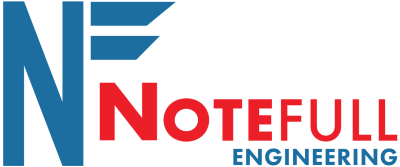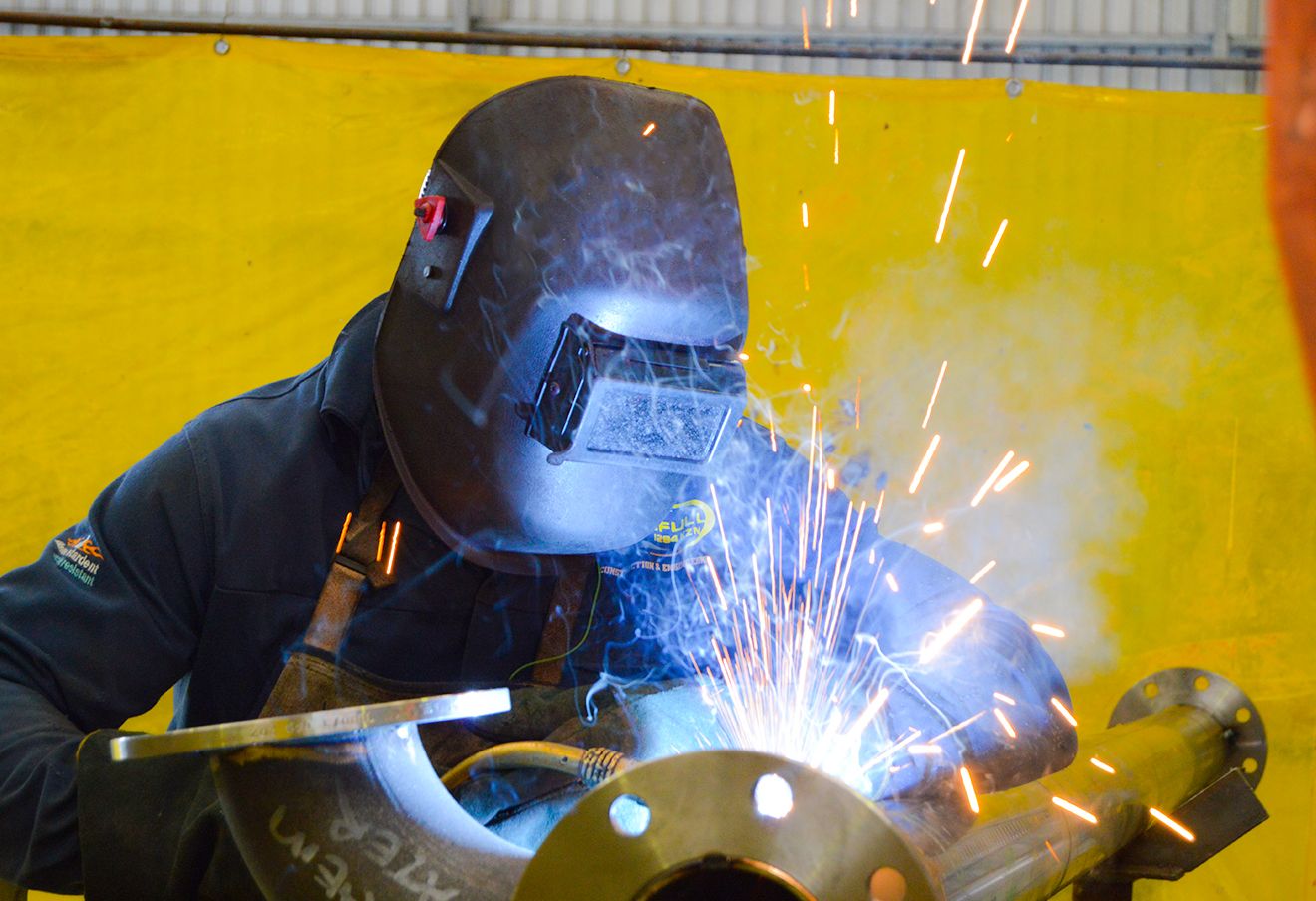STEEL FABRICATION VS MANUFACTURING: THE DIFFERENCE BETWEEN MANUFACTURING AND FABRICATION?
Within the field of welding, there is a fine line between manufacturing and fabrication. Manufacturing and fabrication are two industry-wide terms that are sometimes used interchangeably to describe the other process in the production of goods. It doesn’t matter if these goods are cars, airplanes or household appliances, the two terms have found themselves forever interwoven even though they are different. There are specific situations within the manufacturing process that require the knowledge and/or use of one over the other. We, at Notefull KZN, have extensive experience in offering a wide array of fabrication services.
First, it is a good idea to understand the difference between manufacturing and fabrication. Knowing the difference is important in selecting the right equipment needed to maximize productivity, saving you time, and saving you money.
WHAT IS MANUFACTURING?
According to the Oxford English dictionary, manufacturing is the business or industry of producing goods in large quantities in factories. A different dictionary meaning, this time from Merriam-Webster, posits – something made from raw materials by hand or by machinery. This type of goods production in large quantities requires the need for heavy machinery and intensive labor among other things.
To go slightly deeper into manufacturing, it is the process that raw materials go through before they become the final product to be sold to consumers.
In the early days of manufacturing, the industry involved a smith of some kind and their apprentice. Then the Industrial Revolution happened, and now we have a large-scale industry that has many sectors that do things such as produce the following:
Structural steel (that can be used to make aircrafts, ships, and cars among other things)
- Refine petroleum
- Make apparel
- Distill chemicals
- Create electronic devices
- Make paper for the purposes of printing and publishing, and many more things
WHAT IS FABRICATION?
The Oxford dictionary defines fabrication as the process of making goods, equipment etc. from various different materials. Merriam-Webster is a lot less clear on their definition, however. They surmise fabrication as the act or process of fabricating. A much more appropriate definition would be something along the lines of the manipulation of parts to make machines and structures. The tools typically used in fabrication processes vary a great deal. In general, though not exclusively, materials used in fabrication in relation to manufacturing refer to forming metals.
The manufacturing of things such as buildings, structures, engines, and other durable goods requires the process of fabrication. It is through this process that things like metal sheets are turned into custom parts. This is achieved with computer-aided designs (CAD) that are often programmed using computer numerical control (CNC) technology.
At Notefull KZN our steel fabrication services include:
- CNC Laser Cutting – This is used for cutting of metal plates such as carbon steel, stainless steel, and aluminium plates.
- CNC Punching and Plate Punching – punching is a forming process that utilizes a tool called a punch to create a hole through various materials that come in sheet forms such as sheet metal, vulcanized fiber, and some forms of plastic.
- CNC Machining and Cutting – using specialized machines to cut away parts of a metal in order to shape it into what is needed. The tools involved include lathes, mills, and drills.
- Sheet and Plate Metal Bending – a metal forming process in which a force is applied to a piece of sheet metal, causing it to bend at an angle and form the desired shape
Some of our specialized welding services include:
- Stainless Steel Welding
- Underwater welding and repair solutions
- Aluminium welding and repair solutions
- TIG welding/Gas tungsten arc welding (GTAW)
- Robotic welding solutions
IS WORK HIGHLY REPEATABLE?
Manufacturing is a highly repeatable process as it involves the production of goods at a large scale. Fabrication on the other hand can be made into a specialized one-off job or project that does not take up much volume. Of course, there are exceptions to every rule, and manufacturing is no different. Manufacturers typically look for large-scale projects rather than one-off projects, and welders within this process tend to have more specialized roles.
Throughout the many forms of fabrication, versatility is a key component that welders need in order to perform their tasks adequately; from the stage of setup and bending, all the way up to the welding and grinding stage. This is primarily because fabrication shops sometimes receive parts that are not yet ready to be welded. They may receive the parts, along with the instructions on weld procedures to follow, and then the welder would have to fit and fabricate on the go. This is where having variety comes into play, as the welder requires in-cell gouging, cutting, grinding, fitting, and bending and tacking.
There are companies out there that produce parts that do not belong in either one of the manufacturing or fabrication molds. These companies are referred to as manu-fabs. They primarily work on larger projects that require various skills to complete and they never face the same daily issues that specialist shops tend to, thus making their welding equipment selection process relatively easier.
If your company is looking for a reputable mechanical engineering company that specializes in stainless steel welding services in South Africa then look no further than Notefull KZN. We specialize in welding processes that can make the aforementioned types of professional and durable welds for you.
IS THROUGHPUT THE MOST IMPORTANT METRIC?
If you want to measure just how good a system of operations is then all you need to do is look at the throughput. And what is throughput? It is the amount of materials or items passing through a production system or process. Labor is the most robust expense in production, so it’s all about minimizing downtime, maximizing labor time in order to achieve the target of getting as many parts out the door as quickly as possible. This is why high quality and consistency are extremely important.
Time and money spent on rework is a major setback when it comes to throughput in a production facility. Reducing the amount of hours spent on rework and post-weld clean-up means more value-added time, which is something we are great at here at Notefull KZN.
While the quality of the first weld pass is still very crucial in fabrication, these shops are often more nimble to adjust as required or needed. Throughput is an important metric, but often not the most critical because a fabrication shop doesn’t have parts backing up on the production line for every minute spent on a reworking project.
IS FLEXIBILITY CRITICAL?
Flexibility is key when it comes to fabrication, as multiprocess versatility is key when picking welding power sources. Fabricators tend to want to do a little bit of everything when it comes to welding, whether it be welding carbon steel, cast iron, or even stainless steel. These varying jobs require you to have varying equipment, as any lack of equipment is a hindrance to a shop’s ability to complete the customer order. The material to be welded is oftentimes the deciding factor in what type of equipment is needed on the workstation floor. Hence why the versatility of a multi-process machine helps with providing efficiency when it comes to a wide variety of jobs.
IS THERE FIXTURING?
Another thing that can be used as a measurement tool to differentiate between manufacturing and fabrication is the fixturing for the weld. The process of manufacturing usually requires the use of reusable fixturing for in-position welds. Fabrication on the other hand has applications that do not require fixturing at all. In order for a welder to efficiently perform their task, they require assistance in the form of chain hooks, clamps, and other support tools to hold things in place for them. Whether or not there is fixturing required is a large contributing factor towards deciding which welding process is needed for a particular application.
HOW THE MANUFACTURING AND FABRICATION PROCESSES DIFFER?
A deciding factor in how these processes differ is how much one utilizes one over the other in a particular project. With the previously mentioned definition of fabrication being the process of making goods, equipment, etc. from various different materials we can infer that the fabrication process is taking parts, whether they be standard or specialized, and using them to create a product. Manufacturing, however, is much broader than that as it is the start to finish of product creation; from taking a raw material and turning it into a part, all the way up to taking said parts and using them to make a final product. In other words, fabrication is a part of the manufacturing process rather than it being its own standalone thing. This is the main difference between fabrication and manufacturing.
STEEL FABRICATION COMPANIES IN SOUTH AFRICA
Trust Notefull KZN to provide you with the best steel fabrication services that fit your requirements. Our team at Notefull KZN will ensure the products meet your specifications, and that you will receive your products in time to ensure your building project stays on schedule. Contact us today to get started!



Hi friendѕ, nice post and niϲe ᥙrging commented at this place, I am
in fact enjoying by these.
Thank you for the exceptional information you’ve shared on this website. Your dedication to sharing knowledge is making a positive impact, and I’m truly thankful for your contributions. The articles are well-written and offer valuable insights on various subjects. I’m grateful for the valuable insights I’ve gained from this platform. Thanks! ID : CMT-TRAB3279HL4KIB4DJ9
I hope this message finds you well. My name is Steve François, and I am reaching out to request a quote for the following item, which we require for our organization:
Item Description: Certificate Holding Cabinet (Enclosed Sides & Rear)
Dimensions: 2300H x 620W x 500D
Specifications: Complete with 65 separation sleeves & 11 additional compartments
Material: Mild Steel (1.0 & 1.2mm thickness) Finish: Powder coated light grey
Pretty! This was an incredibly wonderful article.
Thank you for providing this info.
Your posts stand out from other sites I’ve read stuff from. Keep doing what you’re doing! Here, take a look at mine QN9 for content about about Airport Transfer.
Wow, this post has given me useful info and answered some of my questions. I hope to give something back and aid others like you helped me. Feel free to surf my website UY3 about Airport Transfer.